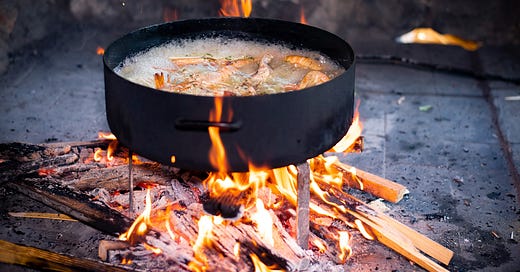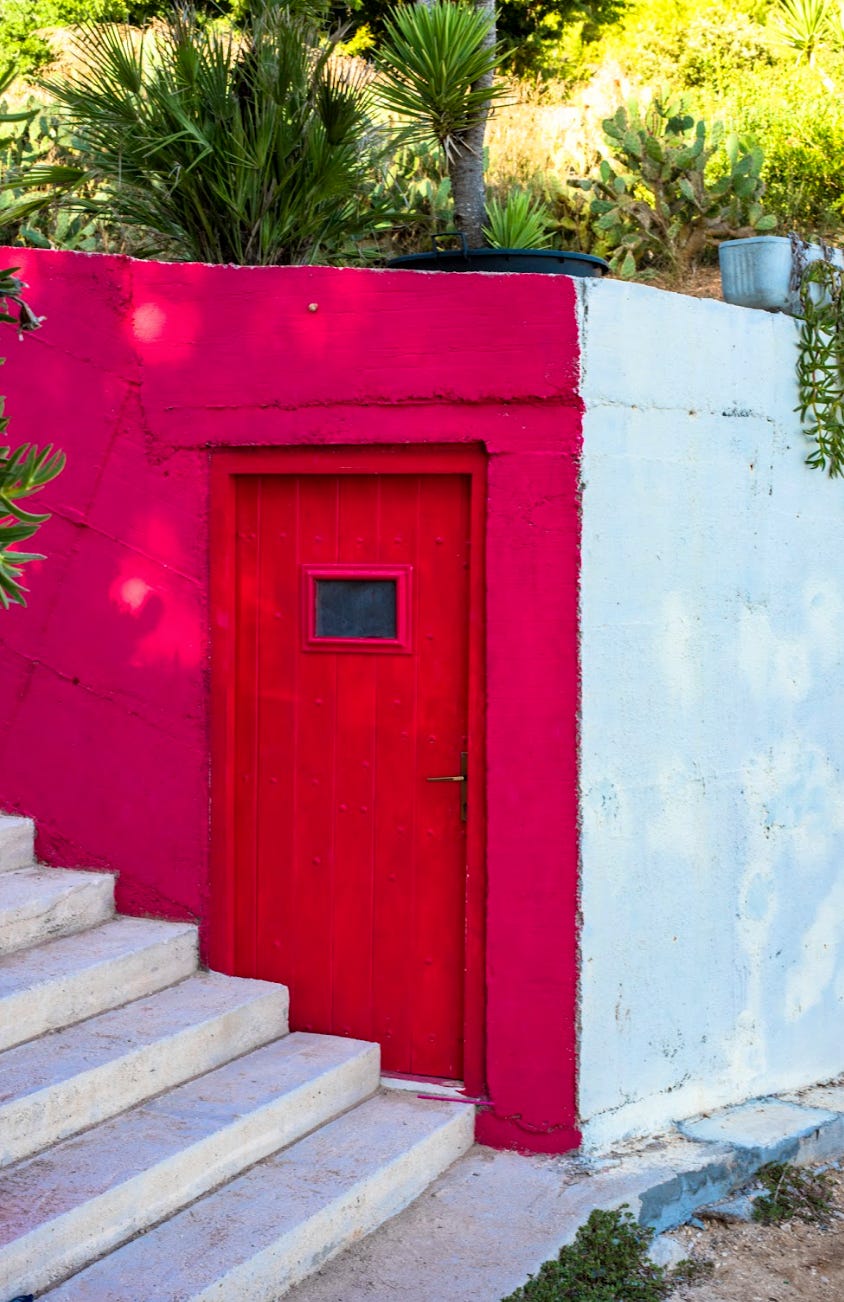Recipe: A Croatian seafood medley for summer
Gregada and grandma Dagmar's wise words from her private island in Croatia
Hi all,
This week’s recipe comes from grandma Dagmar, one of Croatia’s biggest art collectors and resident of her own, cacti-filled island off the coast of the deliciously stunning Croatian island of Hvar. It’s a fresh, summery fish stew traditional to the region and the perfect coastal recipe if you’re holidaying somewhere by the sea this summer / can get your hands on good seafood.
Hvar, Croatia.
It’s hot and tourists are pouring from the ferry out into the Venetian old town. Dagmar has sent a boat for me. I race across the bay to Palmižana island grinning from ear to ear. A battered, chugging Land Rover takes me up the hill, deeper and deeper into a botanical playground.
It drops me at the top of the path down to the Meneghello home - bright red and royal blue, covered with bold art, rosemary bushes, olive and orange trees between mad, giant cacti. Grandmother Dagmar’s family bought the island in 1906 and slowly created a paradise, importing the cacti from Mexico.
Dagmar cooks her seafood Gregada on an open flame. Two tanned males get a menacing fire going in a matter of seconds upon her command and Dagmar used red scorpionfish (traditionally associated with Bouillabaisse), grouper fish, big shrimp and clams for her Gregada.
Once the vast black pot is ready, eight of us women (young and older) eat at a red and blue table overlooking the sea, including two of Dagmar’s best friends - a cool, red-headed artist and beautiful befreckled jewellery designer who exalts the power of female friendships and tells me that ‘women are simply on another dimension’.
Sitting in the dappled shade of the paradise island in the company of grandmother Dagmar and her gaggle of girlfriends is revelatory. It’s an insight into who I want to be when I grow up. We eat the gregada greedily, dipping crusty bread into the sauces, looking out over turquoise waters.
“Men will come and go but your female friendships are the ones that will see you through life,” says Tanya, one of the glamorous women seated around the table. “Our hormones make us obsess over men but then the menopause comes and we’re finally free.”
Up until this moment I thought menopause was all hot flushes and an embarrassing waving goodbye to my youth. This exchange has made the prospect of ageing an exciting moment - a rite of passage to look forward to in life.
It’s another instance in which I realise that recipes aren’t the only things I pick up in the process of writing my books: it’s a fresh perspective on the world, and on womanhood.
Anyone can visit Villa Meneghello, including to eat and stay on the paradise island and meet Dagmar herself, sharing a crisp glass of white wine with the Adriatic in the background.
Scroll down for the recipe but first, here’s Dagmar’s story, in her own words…
I’m now an old lady but I first made this in 1965. When I first came here, to the island of Palmizana, my husband thought he’d also found himself a cook but I really wasn’t well at all. From the very beginning, I had an awful time. There was no electricity and no running water when I first arrived. I always said the best language I could speak at the time was dog language because the only people I had to talk to weren’t actually people, they were dogs.
I’d lived in Zagreb, was the daughter of the county Mayor and a successful journalist but I’d fallen in love. On Palmizana then, we had no taxi boats to ferry us back and forth to Hvar or Split but I couldn’t live without him. I ran away from the island five times but I realised life without him wasn’t bearable.
He was a very attractive man, my husband. When you saw him, your mouth would drop open and you’d catch yourself salivating. He was a very successful fisherman. He would dive for 30 metres deep with no breathing equipment and was known, after the second world war, as a champion free diver. In 1954, there was a book written about sports fishermen and they came here and featured my husband. He caught grouper.
We started with a small generator for electricity and we built everything from scratch. My father and I planted all the cacti that populates the island. He was a botanist and brought it all back from Latin America with him. We always had fresh food on the island because it was all that was available to us. We had to fish for fresh fish because we had no way of preserving it or keeping things for days. I started making Gregada because of all the fish he would bring back. Fresh fish needs as little cooking as possible. When I came here, my husband was the best cook and I learned from him, actually. We would cook it together with fishermen friends of his.
For Gregada, you must have all the ingredients fresh on the day. You can’t cook it with fish from an icebox. If you’re cooking this, ensure that your clams, your fish – everything is sourced on the day. There are not a lot of complex spices or herbs, the fresh fish and the shell of the prawns and the clams gives it a lovely taste of the sea. It’s a famous dish here for us on Palmizana. Amra, the artist staying here with me right now has even painted a beautiful painting of Gregada for us.
I’ve had artists friends to stay from the very start of my time here. In the winter, we sometimes would have 3 or 4 months not seeing anyone and I would get so lonely, so I began to invite my friends to stay for a month or so at a time. The island would become a sanctuary to them and they would paint. That’s why the place is filled with art. I’ve become one of Croatia’s biggest collectors because of it. I love the way that artists have come from all over and really painted a feeling of Palmizana, most of the time leaving their work behind here on the island.
These paintings are not only paintings. People are coming here, and they’re taking soul from this place. When we all die, these works of art will remain, and that is a very nice and comforting thought. I have a similar feeling with special recipes, like my Gregada. Every dish you cook and make is like a painting, you start with some raw ingredients but you can end with something truly beautiful and expressive. It stirs emotion.
DAGMAR,
Born, Ruma, Serbia, 1943
Keep reading with a 7-day free trial
Subscribe to Matriarch Eats to keep reading this post and get 7 days of free access to the full post archives.













